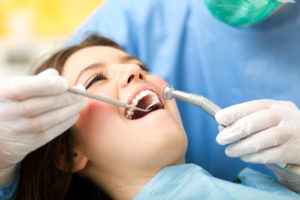 Teeth are vital. They allow us to eat. They allow us to speak. And they keep our entire facial structure from drooping around us. If these vital functions get jeopardized because of a workplace injury, it is the duty of your employer and the workers’ comp insurance to make sure you are repaired closely back to your normal “pre-injury” condition. Imagine you are an employee of the retail giant Walmart, and you slip and fall headfirst on a puddle of water, breaking three teeth and sustaining a deep cheek laceration. A fair expectation would that you—the injured worker—would receive workers’ compensation benefits to pay for your medical and dental bills, time off work, mileage you will incur from going back and forth, etc. Right? Now say you are that same Walmart employee—but prior to sustaining the workplace injury—had neglected your teeth for years and were experiencing significant tooth decay—not to mention tremendous pain—which would require extensive work to repair back to health under any circumstances. However, much of these processes are now mixed up with your workplace injury and certain things must be fixed regardless. How does this get handled in a workers’ comp insurance claim? The short answer—it’s complicated but the insurance company will do everything in their power to separate the pre-existing condition(s) from the injury at hand to minimize their costs—much of the time at the expense and pain of the injured worker. Keep reading to clarify this issue.
Teeth are vital. They allow us to eat. They allow us to speak. And they keep our entire facial structure from drooping around us. If these vital functions get jeopardized because of a workplace injury, it is the duty of your employer and the workers’ comp insurance to make sure you are repaired closely back to your normal “pre-injury” condition. Imagine you are an employee of the retail giant Walmart, and you slip and fall headfirst on a puddle of water, breaking three teeth and sustaining a deep cheek laceration. A fair expectation would that you—the injured worker—would receive workers’ compensation benefits to pay for your medical and dental bills, time off work, mileage you will incur from going back and forth, etc. Right? Now say you are that same Walmart employee—but prior to sustaining the workplace injury—had neglected your teeth for years and were experiencing significant tooth decay—not to mention tremendous pain—which would require extensive work to repair back to health under any circumstances. However, much of these processes are now mixed up with your workplace injury and certain things must be fixed regardless. How does this get handled in a workers’ comp insurance claim? The short answer—it’s complicated but the insurance company will do everything in their power to separate the pre-existing condition(s) from the injury at hand to minimize their costs—much of the time at the expense and pain of the injured worker. Keep reading to clarify this issue.
Pre-Existing Versus Workplace Injury
It is customary for a dentist to treat the whole mouth. That is the way they were trained and what is considered ‘best practice” in the field of dentistry. Unfortunately, workers’ comp is not a “whole” health insurance model and strives to keep costs low with ailments unrelated to the injury. It is up to the dentist to differentiate what is related to the injury and what was a pre-existing condition. The insurance company will not allow treatment for anything outside that specific condition without medical evidence showing the exact causal relationship in the claim. So, back to our example with you being the Walmart employee. Let’s say besides the fractured teeth and cheek laceration repair, the insurance company receives a bill for an extra $10,00 because the dentist charged to treat cavities, extraction of multiple teeth, periodontal disease, and gingivitis—all related to your pre-existing dental condition—but all very necessary to treat the injury at hand. If you got an infection you could die. The dentist recognizes that and knows these other conditions must be treated for a successful repair of the workplace injury. Even with that knowledge, the insurance will try not to pay for anything outside of resulting directly from the injury, which leaves the remaining financial burden on the shoulders of the injured employee. The dentist will do an oral evaluation prior to treatment to determine what will be billable and what will not be billable and hopefully be able to run it by the injured worker (depending on the severity of the injury) so decisions can be made. For the unconscious injured worker, they may end up with a substantial bill for which they had no ability to voice their opinion.
What Should I Do If I Get a Dental Injury at Work?
It is important to follow the specific set procedure, so your claim can’t be denied later. The first step is informing your supervisor about the incident. If your employer says you are not covered because you should have “seen the water puddle”, then get a lawyer. You must know your rights. After reporting the incident, you must find a dentist that is a participating provider of the worker’s comp program. Depending on the extent of your injuries, you may be treated on an emergency basis or sometimes, problems don’t crop up until days later and you must be seen then. Some common dental injuries include:
- Chipped Tooth
- Gum irritation
- Severe cuts on lips, gums
- Part or whole tooth knocked out
- Loose tooth
- Temporomandibular Joint (TAJ) Syndrome
The dentist will develop a treatment plan and obtain any prior authorization needed. Always remember that the dentist will only bill the insurance company anything that is related to the specific injury because that is what he or she is required to do. The other costs could be billed to you. If you experience any difficulty with getting the dental coverage you deserve, or your employer is making things difficult, do not hesitate to consult with a lawyer.
